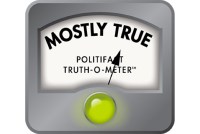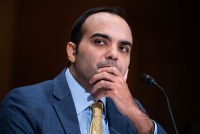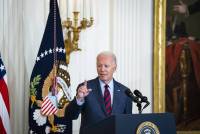Latest KFF Health News Stories
California Becomes Latest State To Try Capping Health Care Spending
California is the ninth state to set annual health spending targets for the industry. Already hospitals and doctors are voicing resistance to the fledgling Office of Health Care Affordability, even as they avoid overtly opposing its goals.
Los Angeles County Launches Ambitious Plan To Tackle Medical Debt. Hospitals Groan.
Los Angeles County, the nation’s most populous county, is spearheading a comprehensive plan to tackle a $2.9 billion medical debt crisis. Hospitals are still getting on board with the project, which is helmed by the public health department.
Biden Is Right. The US Generally Pays Double That of Other Countries for Rx Drugs.
Research has consistently found that, overall, U.S. prescription drug prices are significantly higher, sometimes two to four times as high, compared with prices in other high-income industrialized countries. However, some market factors can obscure actual prices, making comparisons harder.
With Medical Debt Burdening Millions, a Financial Regulator Steps In to Help
The Consumer Financial Protection Bureau, created after the Great Recession of 2007-09, has increasingly started policing the health care system.
Lawsuits Claim South Carolina Kids Underwent Unnecessary Genital Exams During Abuse Investigations
Lawsuits allege that several children under 18 in South Carolina have undergone examinations of their private parts during child abuse investigations — even when there were no allegations of sexual abuse. There’s a growing consensus in medicine that genital exams can be embarrassing, uncomfortable, and even traumatic.
Woman Petitions Health Insurer After Company Approves — Then Rejects — Her Infusions
Even people with good insurance aren’t guaranteed affordable care, as this KFF Health News follow-up to one patient’s saga shows.
What the Health? From KFF Health News: Democrats See Opportunity in GOP Threats to Repeal Health Law
Sensing that Republicans are walking into a political minefield by threatening once again to repeal the Affordable Care Act, the Biden administration is looking to capitalize by rolling out a series of initiatives aimed at high drug prices and other consequences of “corporate greed in health care.” Meanwhile, the Supreme Court hears a case that could determine when and how much victims of the opioid crisis can collect from Purdue Pharma, the drug company that lied about how addictive its drug, OxyContin, really was. Alice Miranda Ollstein of Politico, Anna Edney of Bloomberg News, and Rachana Pradhan of KFF Health News join KFF Health News chief Washington correspondent Julie Rovner to discuss these issues and more. Also this week, Rovner interviews Dan Weissmann of KFF Health News’ sister podcast, “An Arm and a Leg,” about his investigation into hospitals suing their patients over unpaid bills.
FTC Chief Gears Up for a Showdown With Private Equity
Lina Khan, chair of the FTC, says a recent lawsuit is meant to chill the consolidation of medical groups that results in higher prices for consumers. But it may be too late to curb price hikes.
Uncle Sam Wants You … to Help Stop Insurers’ Bogus Medicare Advantage Sales Tactics
The Biden administration wants to crack down on deceptive or misleading Medicare Advantage and drug plan sales tactics. It’s counting on beneficiaries to help catch offenders.
Compensation Is Key to Fixing Primary Care Shortage
Many proposals have been floated about how to address the nation’s primary care problem. They range from training slots to medical school debt forgiveness but often sidestep comprehensive payment reform.
Why It’s So Tough to Reduce Unnecessary Medical Care
Treatments that don’t help patients, and may even harm them, are difficult to eliminate because they can be big sources of revenue.
Sin barreras, los precios de algunos medicamentos existentes se han disparado, incluso cuando han caído drásticamente en otros países. Los nuevos medicamentos tienen precios enormes, respaldados por el lobby y el marketing.
A Peek at Big Pharma’s Playbook That Leaves Many Americans Unable to Afford Their Drugs
Brand-name drug prices in the U.S. — more than three times the price in other developed countries — are related neither to the amount of research and development required to bring them to market nor their therapeutic value, recent research shows. Have drugmakers overplayed their hand?
Proposed Rule Would Make Hospital Prices Even More Transparent
A Biden administration proposal would help standardize the data on prices that hospitals provide to patients, increase its usefulness to consumers, and boost enforcement. Previous rules gave hospitals too many loopholes.
What the Health? From KFF Health News: Another Try for Mental Health ‘Parity’
President Joe Biden is kicking off his reelection campaign in part by trying to finish a decades-long effort to establish parity in insurance benefits between mental and physical health. Meanwhile, House Republicans are working to add abortion and other contentious amendments to must-pass spending bills. Joanne Kenen of the Johns Hopkins Bloomberg School of Public Health and Politico, Anna Edney of Bloomberg, and Sarah Karlin-Smith of the Pink Sheet join KFF Health News’ chief Washington correspondent, Julie Rovner, to discuss these issues and more. Also this week, Rovner interviews KFF Health News’ Céline Gounder about her podcast “Epidemic.” The new season focuses on the successful public health effort to eradicate smallpox.
Everything Old Is New Again? The Latest Round of Health Policy Proposals Reprises Existing Ideas
House Republican legislation promises more health insurance options but fewer protections, even as the Biden administration seeks to rein in short-term plans, which were expanded in the Trump era.
As Nonprofit Hospitals Reap Big Tax Breaks, States Scrutinize Their Required Charity Spending
Nonprofit hospitals avoid paying taxes if they provide community benefits such as charity care. More states are examining that trade-off, scrutinizing the extent of hospitals’ spending on their communities.
La atención primaria está cambiando: el acceso y la calidad están en juego
Una relación sólida y duradera con un médico de atención primaria —que conozca el historial del paciente y pueda vigilar nuevos problemas— se ha considerado durante mucho tiempo la base de un sistema sanitario de calidad.
Will the Doctor See You Now? The Health System’s Changing Landscape
The “front door” to the health system is changing, under pressure from increased demand, consolidation, and changing patient expectations.
International Rights Group Calls Out US for Allowing Hospitals to Push Millions Into Debt
In a new report, Human Rights Watch urges stronger federal and state action to hold hospitals to account for a medical debt crisis that now burdens more than 100 million Americans.























